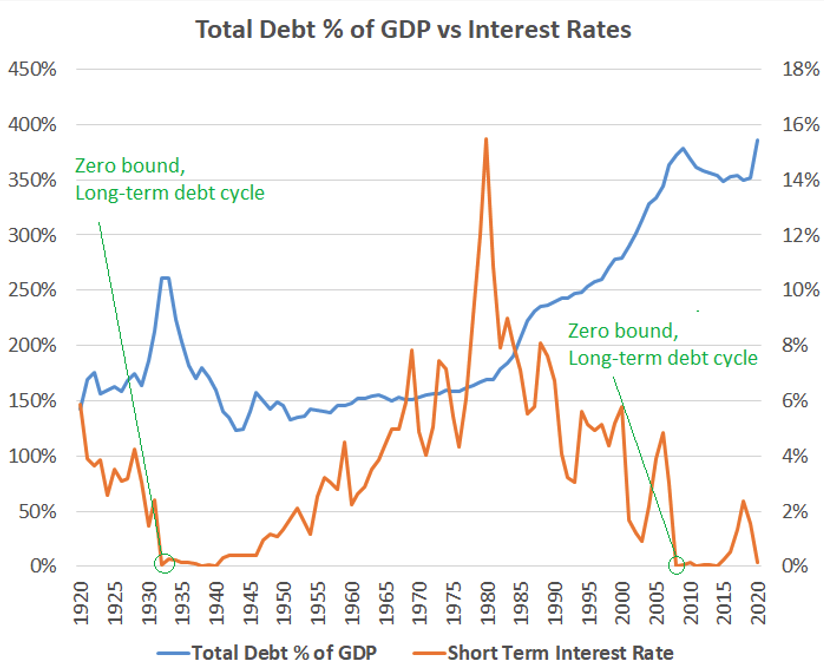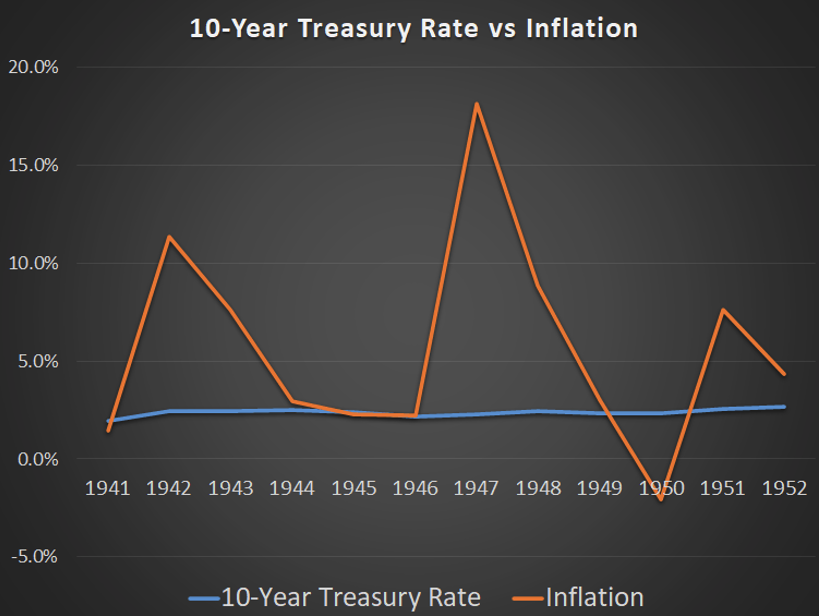Lyn Alden is the founder of Lyn Alden Investment Strategy, where she provides market research to tens of thousands of individual investors and financial professionals. With a focus on income-generating investments, she provides the overall macro picture of the industry. Lyn reminds us why it is important to look at the bigger picture, especially in crypto. With her weekly newsletters and informative research, she has become a known name in the Industry. Please take a look.
Lyn Alden
Interview Date : 13th October 2020
Negative Real Yield Age
In most countries around the world, we are in a period of negative real yield. Meaning that most of our bank accounts and most of our bonds pay below the inflation rate. This is likely to persist for quite some time due to how much debt there is in the system.
Some of the macro research I do is inspired by Greg D’Aleo who popularized the topic of the consequence of a long-term debt cycle. We did have a big debt problem before the pandemic, and the pandemic made it worse. If you look at the short-term business cycles in many countries, you have this “boom-bust cycle” where you have debt build-up in the system. There will be some sort of a catalyst that either hits the economy naturally, or governments get an external catalyst that creates negative feedback for the economy. With that, we get a period of deleveraging and recession. So, central banks come in and cut interest rates, whereas fiscal authorities step in and spend money to stimulate the economy. The authorities will partially deleverage, so companies and households with malinvestments get defaulted on. Because interest rates were lowered, they never really deleverage all the way. Maybe the interest rate will be deleveraging only half the way, and then governments start building up from there. The driving force behind this is especially due to policymakers wanting to make it quick to keep recession short and get people back to work. Thus, they partially deleverage and start building up from there.
Boom Bust Cycles
If we string multiple of those business cycles together, you get long term debt cycles, where interest rates get lower and lower, and debts get higher and higher as a percentage of GDP. That all comes to a head when interest rates hit 0, because the central bankers will not be able to stimulate in that way anymore. There are very big “boom-bust cycle” characteristics particularly here in the US. When they hit the 0 bound and they cannot do much more, that is when fiscal authorities come in and they spend a lot of money.

If you look back at US history, the last time interest rates hit 0 was in the 1930s. Eventually, that was resolved by massive fiscal spending with yields for bank accounts and bonds being kept below the inflation rate. The authorities basically inflated a lot of that debt away. All of the sovereign debt was paid back nominally, but people lost in terms of purchasing power. Anyone holding cash or holding sovereign bonds got all their money back, but the same dollar now bought a lot less. This is how historically monetary sovereign countries get out of big debt bubbles. From the mid-1930s to the mid-1970s, there was roughly a 40-year period where 10-year treasury bonds, for example, were very poor investments. It was worse in many other countries that lost wars in that period.

The US was actually one of the stronger countries for having the least currency devaluation. Thus, these things tend to happen on a global scale, it is not only one country it can affect. Even though it was a relative situation, the US treasuries lost ⅓ of their purchasing power in the 1940s, and another ⅓ of their purchasing power in the 1970s, when you add both those two factors together are really how federal debt as a percentage of GDP was decreased. We saw similar and usually worse playouts in other countries.
I believe that sovereign entities have 2 potential options. For the first, they could try to do some debt jubilee with their sovereign debt the central bank forgives the sovereign debt. They can use financial engineering to have that happen. Or, they can hold interest rates below the inflation rate for a while. But by doing that, anyone holding these bonds or cash in the banks has their purchasing power chipped away over time.
1930s Illegal to Hold Gold
Back when people didn’t have computers or the internet, information got around a lot slower. People could not go online, and see what the inflation rate was, or what their rates were. There was far less information available, and even the people who were watching out for the markets were just getting all the information from newspapers. However, the majority of many people were not following it at all. In the 1930s and 1940s, one of the answers to maintaining your wealth would be gold. In this way, if you held gold, you defended against all that currency devaluation. To cancel out this option, many countries including the US, made it illegal to own gold. Also, because people could not track real-time information, they did not really see the need for it to buy gold.
We know what the authorities did back then, so have understood the playbook. Today, we can see every move in real-time, and we can directly measure rates, etc. I think this knowledge does create more incentive for people to find alternative assets. That is what we are seeing in equity markets today, where we have the worst ever economic shock for many countries since the great depression, the worst economic situation in decades, but we have stock markets that are doing pretty well. That is because people are realizing “I rather own stocks than keep my money in the banks, with the amount of stimulus that’s happening”, and they think “I rather own a kind of equity in a company that produces cash flows.” Accordingly, we have seen very good rises in Gold as well as in Bitcoin prices in the past 2 years and Bitcoin.
Reducing Tail Risk
I think diversification helps reduce tail risk. If you put all your assets in one sort of asset class, it’s easier to have a 30~40 % drawback in that asset class whereas if you diversify, it can be protected to some extent. Now there will be occasional periods, where there will be a liquidity event like we saw in March. Although all the assets dropped together, they pop back up at different rates depending on how much they were impacted. Certainly, Gold and Bitcoin popped up very quickly because they are non-debt instruments. On the other hand, bank stocks and energy stocks came back less strong because they were more impaired. If people can ignore some of the short-term volatility, diversification can play a strong role in protecting major loss of wealth.
Diversification Can Stop Major Wealth Loss
Equities, real estates, even from foreign countries should be considered. I have US, European, and Japanese equities plus emerging market equities. I have that it spread out so I am not tied to any one market or to one set of fiscal policymakers. In our present environment, I think Gold and Bitcoin add a lot to a portfolio. Historically, Gold tends to be inversely correlated to real industries. When you put your money in a bank and the interest rate you get is higher than the inflation, for example, a 2 % interest rate a year, would be a pretty good environment to hold cash. In such cases, Gold tends to do less, but if you would get a 0.5% interest rate in a bank where inflation is 1%, you will be slowly losing money by holding it in a bank. You always have that potential tail risk of a more rapid loss of a currency, therefore, some of those alternatives like Gold, Bitcoin, appropriately priced real estate, commodities, or anything that has scarcity in such environments tend to hold up pretty well. Thus, I think diversification reduces that fear to some extent.
Countries With No Stock Markets Still Have Impact
Countries that do not have any stock markets have strong incentives to get into some alternatives like Bitcoin. Currency weakening is a strong factor leading people to Bitcoin, and fortunately, Bitcoin is one of the most accessible assets for people now. That is also one of the advantages it has over Gold; everyone with an internet connection can find a way to get Bitcoin. It is a way for people to take their purchasing power out of their local currency. Iran is another example where they have been promoting mining. It is interesting when you see the different policy responses from country to country. For example, Russia and China have been a little more antagonistic towards Bitcoin whereas countries like Iran and Turkey have been more open to it. So, they all are responding to it differently, but generally, the people from such countries have more experience with currency devaluation. They understand the value proposition of hard assets far better than people that live in developed countries.
Attention Needed to Be Paid To What?
Pay attention to real industries around the world, because that is one of the major drivers and incentives for people to try out alternative assets. When you are in a prolonged negative period, there is more incentive for people to buy Gold or Bitcoin, or some farmland, basically anything that is scarce. Some of those assets do not yield anything which normally is a high opportunity cost. If you can get a positive return on your investment, like for holding it in a bank or in a sovereign bond, then you should have it in the banks. However, when you cannot get any positive yield from those saving instruments, some of those high-quality yield-less assets become a lot more attractive. In some cases, you can even get a yield on those assets, like India has gold bonds. Other companies offer yield on Bitcoin. Thus, there is a higher incentive to invest in scarcer assets when you have negative real interest rates.
Interviewer , Editor : Lina Kamada
【Disclaimer】
The Article published on this our Homepage are only for the purpose of providing information. This is not intended as a solicitation for cryptocurrency trading. Also, this article is the author’s personal opinions, and this does not represent opinion for the Company BTCBOX co.,Ltd.


